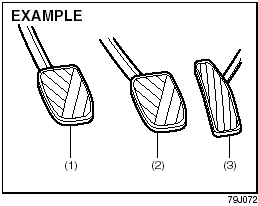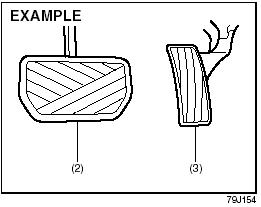Pedals

Manual transaxle

Automatic transaxle
Clutch Pedal (1)
(For manual transaxle).
The clutch pedal is used to disengage the drive to the wheels when starting the engine, stopping or shifting the gearshift lever. Depressing the pedal disengages the clutch.
CAUTION:
Do not drive with your foot resting on
the clutch pedal. It could result in
excessive clutch wear or clutch damage.
Brake Pedal (2)
Your SUZUKI vehicle is equipped with either front and rear disc brakes or front disc brakes and rear drum brakes.
Depressing the brake pedal applies both sets of brakes.
You may hear occasional brake squeal when you apply the brakes. This is a normal condition caused by environmental factors such as cold, wet, snow, etc.

WARNING:
If brake squeal is excessive and
occurs each time the brakes are
applied, you should have the brakes
checked by your SUZUKI dealer.

WARNING:
Do not “ride” the brakes by applying
them continuously or resting your
foot on the pedal. This will result in
overheating of the brakes which
could cause unpredictable braking
action, longer stopping distances or
permanent brake damage.
Accelerator Pedal (3)
This pedal controls the speed of the engine. Depressing the accelerator pedal increases power output and speed.
See also:
Exhaust Gas Warning
WARNING:
Avoid breathing exhaust gases.
Exhaust gases contain carbon monoxide,
a potentially lethal gas that is
colorless and odorless. Since carbon
monoxide is difficult to detect by
its ...
Going & Stopping
For a V-6 with paltry mileage, the Grand Vitara's acceleration is merely
adequate. Our friends at MotorWeek clocked a comparably equipped 4WD Grand
Vitara automatic's 0-60 mph time at 9.0 seconds. ...
Automatic Heating and Air Conditioning System (Climate Control)
Description of Controls
Temperature selector/Air conditioning switch (1)
This is used to select the temperature by
turning the selector.
Also, this is used to turn on and off the air
conditio ...
